Background
Born in Prague in 1854, Karl Kautsky was the son of a Czech painter and his actress wife.


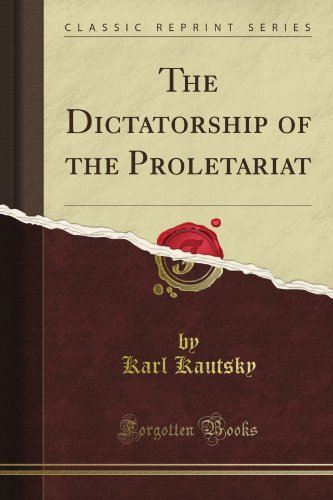
(Karl Kautsky, the author of The Dictatorship of the Prole...)
Karl Kautsky, the author of The Dictatorship of the Proletariat, of which an English translation is now submitted to the public, is the most eminent Socialist writer of the Continent. Kautsky is 65 years of age, was bom in A ustria, and has lived most of his life in Germany. He resided in London, in close association with Friedrich Engels, from 1885 to 1890, and studied daily at the British Museum. For more than thirty years Kautsky has served International Socialism with high literary ability, great learning, and unusual aptitude for sociological research. Students of economics owe him a heavy debt for the laborious and difficult work of editing the literary remains of Karl Marx. In 1882, Kautsky, in partnership with another, founded the Neue Zeit, from the editorship of which he was deposed by the German Majority Socialists in May, 1918. His various books have been translated into many European languages, and have been an important factor in the education of the European working classes. By way of recreation from his political and economic duties, Kautsky employed his scanty leisure in the study of Christian origins, and some ten years ago published The Origirr of Christianity, one of the most fascinating books on that subject ever written. (Typographical errors above are due to OCR software and don't occur in the book.) About the Publisher Forgotten Books is a publisher of historical writings, such as: Philosophy, Classics, Science, Religion, History, Folklore and Mythology. Forgotten Books' Classic Reprint Series utilizes the latest technology to regenerate facsimiles of historically important writings. Careful attention has been made to accurately preserve the original format of each page whilst digitally enhancing the aged text. Read books online for free at www.forgottenbooks.org
http://www.amazon.com/gp/product/B008IXZW3G/?tag=2022091-20
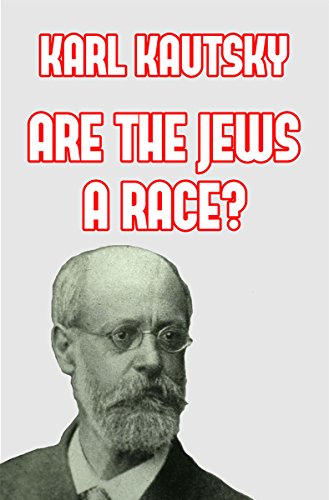
(An early attempt by one of the worlds leading Jewish Com...)
An early attempt by one of the worlds leading Jewish Communist theoreticians to counter early twentieth century ant-Semitismwhich argued that Jews were an alien non-European raceby attempting to prove that the Jews do not constitute a specific race, but are rather a mixture of many different groups. In this book, Karl Kautsky analyses physical traits and behavioural patterns among Jews and non-Jews alike, sets out what he sees as the definition of pure and mixed races, and then posits Jewish history over these two frameworks to draw his conclusion that the Jews are of mixed racial origins. He also discusses the mental attributes of Jews and their propensity to urbanized commercial lifean attribute which Kautsky ascribes to centuries of selective in-breeding in the mercantile classes. Although parts of this work have now been superseded by modern DNA tests (which have proven that Jews do indeed share a great genetic commonality), Kautskys discussion of Zionism, antiSemitism, and the future of Palestine and the assimilationist trends of World Jewry are still highly relevant and of importance to the present-day. Jews of the present day are not a pure race, either geographically or chronologically; even the most superficial acquaintance with their history will prove this statement. Judaism arose on the soil of Palestine, a border region between two areas, each of which embraces a distinct race, probably the result of the peculiarities of the two regions: in Palestine, the foot-hills of mountainous Asia Minor (in the widest sense of the word, therefore, including Armenia), whence originated the Armenoid type, and the beginnings of the extensive steppes of Arabia, extending as far as Mesopotamia. Primitive Israelitic history is of course still very obscure: the reports in the Bible are absolutely unreliable. But there is no doubt among scholars that the population of Palestine must have constituted a mixture of races at a very early period, however greatly they may differ in minor points. Finally Kautsky concludes that the real cause of the Jewish Question is religion, and Judaism in particularand maintains that only when Judaism completely disappears will there be peace on this issue.
http://www.amazon.com/gp/product/B00M3K6A6S/?tag=2022091-20
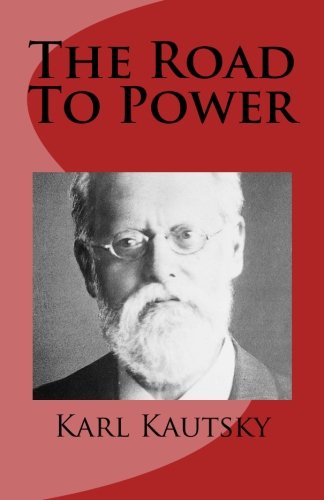
(Friends and enemies of the Socialists agree upon one thin...)
Friends and enemies of the Socialists agree upon one thing, and that is that they constitute a revolutionary party. But unfortunately the idea of revolution is many-sided, and consequently the conceptions of the revolutionary character of our party differ very greatly. Not a few of our opponents insist upon understanding revolution to mean nothing else but anarchy, bloodshed, murder and arson. On the other hand there are some of our comrades to whom the coming social revolution appears to be nothing more than an extremely gradual, scarcely perceptible, even though ultimately a fundamental change to social relations, much of the same character as that produces by the steam engine.
http://www.amazon.com/gp/product/1490926658/?tag=2022091-20
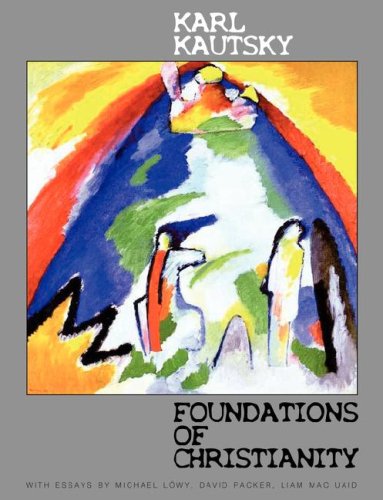
(Karl Kautsky is probably the first Marxist to interest hi...)
Karl Kautsky is probably the first Marxist to interest himself both in the movement and the enigmatic personality of the crucified prophet. His 1908 book The Foundations of Christianity is a rather impressive attempt at a Marxist analysis. The book is rather original, innovative and has been rranslated into nine languages. Kaustky made his Foundations of Christianity into one of the most popular Marxist theoretical works. Its popular success is probably due to the interest of socialist militants to see a vision of the origins of Christianity which permits the modern workers' movement to appropriate to itself the figure of Jesus as a prophet and martyr for the proletarian cause. Kautsky wanted to interpret early Christianity as a precursor of the contemporary working class socialist movement. His friend, and later his opponent, Rosa Luxemburg, in an article of 1905 called "The Church and Socialism insisted that the first Christian apostles were Communists who denounced injustice and the cult of the Golden Calf". He counterposed a materialist account of the new religion against the Christian mythology and showed the capacity of the Marxist method to give an account of a complex historical process, interpreting a religious phenomenon in terms of the class struggle. The book is divided into four sections: 1) Society at the time of the Roman Empire: the slave economy, the absolutist forms of the state, the different manifestations of cultural and religious crisis. 2) Judaism: the class conflicts of Israelite society and the various political-religious currents (Sadducees, Pharisees, Zealots and Essene. 3) The beginnings of Christianity: the early Christian communities, the idea of the messianic Christ and Christian communism. 4) The fourth section is dedicated to the "personality of Jesus". According to Kautsky, what distinguishes Jesus' messianism from the other rebellious Jewish prophets of the era - all of whom had a strictly national character - is its social character, its calling as an international redeemer. "Only the social Messiah, not the national, could transcend the limits of Judaism", survive the destruction of the temple in Jerusalem and, above all, find a hearing among the poor of all nations. By associating the hostility of the oppressed classes to the rich with proletarian solidarity, the messianism of the Christian communities promised the redemption of the poor, and so it could gain followers beyond the Jewish world. In the last analysis, Jesus, "the crucified proletarian Messiah" managed to defeat Rome and conquer the world, but in the course of this process the Christian movement suffered an "inverse dialectic":it lost its proletarian and communist character and was transformed into a state religion, under the control of a vast dominating and exploiting apparatus - the Church.
http://www.amazon.com/gp/product/0902869930/?tag=2022091-20
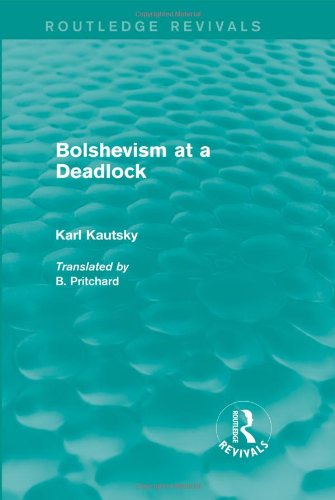
( Bolshevism at a Deadlock was written Karl Kautsky, one ...)
Bolshevism at a Deadlock was written Karl Kautsky, one of the leading Marxist intellectuals of the late-nineteenth and early-twentieth centuries, in response to the catastrophic failures of Stalins first Five Year Plan, which was intended to raise Russian industry and productivity to equal that of Western Europe. Kautsky sets out to demonstrate how the repressive autocracy of the Bolsheviks and the disregard for economic exigencies achieved nothing more than "the wholesale pauperisation and degradation of the Russian people", and prophesies the imminent collapse of Soviet Russia in the face of mass famine, ideological dogmatism and, ultimately, the failures inherent in the 1917 Revolution itself. Kautskys analysis of the situation of Socialist Russia at the beginning of the troubled 1930s will be of interest to students of pre-war Soviet political practice, economic history and domestic policy.
http://www.amazon.com/gp/product/041574265X/?tag=2022091-20
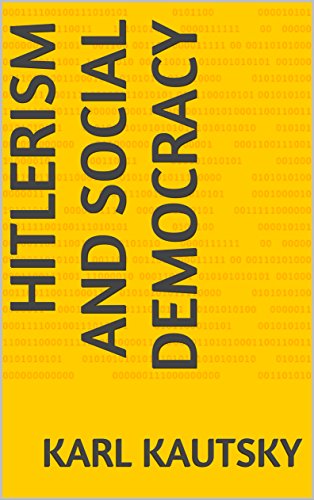
(Karl Kautsky, the leader of the second International, des...)
Karl Kautsky, the leader of the second International, describes and exposes the social forces that brought Hitler to power. Written in 1934, this rare masterpiece is a must read for anyone interested in the history of Europe, Germany, and the rise of Hitler.
http://www.amazon.com/gp/product/B01NBYZNMX/?tag=2022091-20
journalist philosopher Marxist-theoretician
Born in Prague in 1854, Karl Kautsky was the son of a Czech painter and his actress wife.
His studies at the University of Vienna were mainly scientific, however, rather than artistic.
Although he considered himself a Socialist by 1875, it was his encounter with Wilhelm Liebkneckt and Eduard Bernstein about 1880 that brought him to Marxism, and in 1883 he became editor of Die neue Zeit, which soon became the leading Marxist theoretical journal in Germany and perhaps the world. In 1887 he published The Economic Doctrines of Karl Marx, which did much to popularize Marxist ideas.
Kautsky was the author of much of the Erfurt program of 1891, strongly Marxist and revolutionary in tone, which was to remain the official program of the party throughout the imperial period, and he strongly resisted the revisionist tendencies associated with Bernstein that subsequently challenged many of the basic assumptions laid down at Erfurt.
Kautsky broke with the majority of the Social Democrats during World War I. Convinced of the war guilt of Germany and Austria, he joined the pacifist Independent Socialists (USPD), which cost him the editorship of Die neue Zeit. Though most of the Independent Socialists came from the radical wing of the prewar party, Kautsky did not share their enthusiasm for the Bolshevik revolution in Russia, and he became one of its most vocal Socialist opponents (especially in his Dictatorship of the Proletariat, 1918).
After the German revolution of 1918 Kautsky served briefly in the republican government in the Foreign Office and on the Socialization Commission. In 1919 he helped edit a collection of documents on the outbreak of the war, tending to show the guilt of the Kaiser. But in general Kautsky was without much influence in the post-war Social Democratic party or in the Weimar regime. He moved to Vienna, which he had to flee at the time of the Anschluss, just before his death in 1938.
Kautsky is notable for, in addition to his anti-Bolshevik polemics, his editing and publication of Marx's Capital, Volume IV (usually published as Theories of Surplus Value).
( Bolshevism at a Deadlock was written Karl Kautsky, one ...)
(An early attempt by one of the worlds leading Jewish Com...)
(Karl Kautsky, the author of The Dictatorship of the Prole...)
(Karl Kautsky is probably the first Marxist to interest hi...)
(Karl Kautsky, the leader of the second International, des...)
(Friends and enemies of the Socialists agree upon one thin...)
(Format Paperback Subject History)
He became a member of the Social Democratic Party of Austria (SPÖ) in 1875. In 1917 he left the SPD for the Independent Social Democratic Party of Germany (USPD), which united Socialists who opposed the war. In 1920, when the USPD split, he went with a minority of that party back into the SPD.
Ideologically, Kautsky (along with August Bebel) represented the Socialist "center" which retained its belief in the inevitable—indeed imminent—collapse of capitalism, but which differed from the radical left in holding that socialism was possible only through political democracy. Unlike the Socialist right, however, Kautsky maintained that imperial Germany was too undemocratic for Socialists to participate in governmental coalitions and that therefore they must remain in the opposition.
Quotations:
"The capitalist class rules but does not govern: it contents itself with ruling the government. "
"The war brought things to a head, exposing the utter falsity and rottenness of Kautskyism from its very first day. "
"The war brought things to a head, exposing the utter falsity and rottenness of Kautskyism from its very first day. "
He married Luise Kautsky. His son, Benedikt Kautsky (de) spent seven years in concentration camps; his wife Luise Kautsky died in Auschwitz.
He was a Czech scenic designer, landscape painter and co-owner of "Brioschi, Burghart und Kautsky", a stage decorating company in Vienna.
She was an actress and writer.
She was a German politician and member of the USPD.
